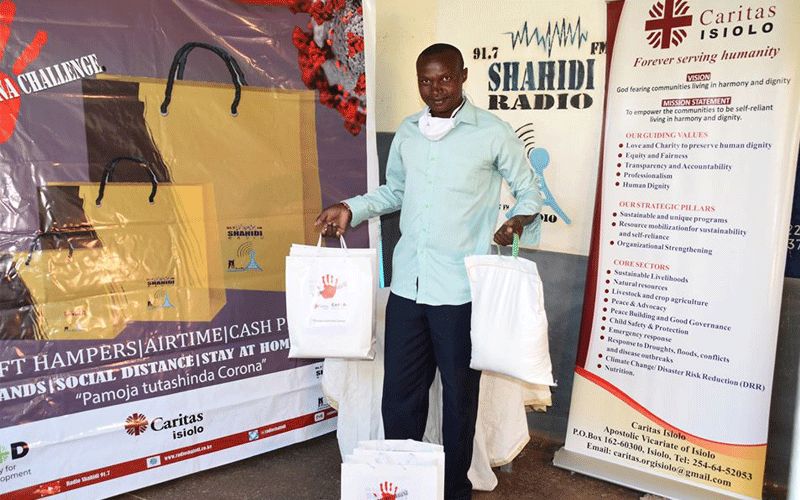The concept of the radio challenge was developed with a double goal: members of the community learn about COVID-19 and they also benefit materially from the initiative having lost their livelihoods amid the pandemic, the Communications Officer of Caritas Isiolo, Lamech Onyari told ACI Africa.
“We couple the challenge with radio talk where we sensitize the community about some COVID-19 aspects such as hygiene, stigma, alternative recovery approaches among other issues,” the Caritas Isiolo official said Wednesday, July 1 and added, “We also have a message from the Church to the community about COVID-19.”
At the end of the radio talk, Mr. Onyari says, the host poses a COVID-19 question to the listener, such as how to distinguish COVID-19 from other viral infections, myths and misconceptions about the disease in the community, national COVID-19 infection statistics, as well as COVID-19 and gender-based violence hotline numbers.
The winner of the day’s questions walks away with phone airtime worth US$1.00 to facilitate communication and enforce social distancing, while the weekly grand winner walks away with US$25.00 in cash and a gift hamper worth US$15.00, Radio Shahidi’s Station Manager, Maurice Mawera told ACI Africa Wednesday, July 1.
Among the grand winners of the KomeshaCorona Challenge is 27-year-old Gilbert Mutuku, who in mid-May walked away with a cash award and gift hamper full of a month-long food supplies such as maize and wheat flour, as well as masks and sanitizers.
The loyal listener of the radio station considers the radio show “informative and helpful” saying, “It has helped me know how I can protect myself from contracting COVID-19 and also the importance of embracing those who may contract the disease.”
The success of the initiative, Mr. Onyari told ACI Africa, has attracted other willing partners such as ActionAid International, the 48-year-old global movement of people fighting for women’s rights, social justice and an end to poverty.
Besides Kenya, CAFOD is partnering with radio outlets in Sierra Leone, Uganda and South Sudan to reach out to community members with reliable information about the pandemic.
“Today, radio is still a crucial tool used by local experts across the world to provide life-saving information to people who can’t rely on newspapers, who don’t read, or who can’t trust the information sources otherwise available to them,” CAFOD leadership has been quoted as saying.
Founded in 1962 by Jacquie Stuyt and Elspeth Orchard, CAFOD works with some of the “most hard-to-reach” communities across Africa, Asia, Latin America and the Middle East, helping the poorest and most marginalized people.








